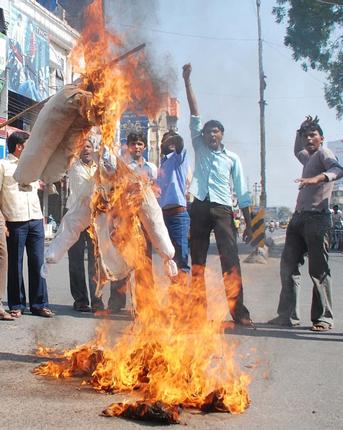
Violating the curfew, people in some parts of the town took to the streets, clashed with police and indulged in arson and stone pelting.
Police fired rubber bullets, teargas shells and carried out to baton charge as protestors including women attacked them with stones at few places in the town, about 700 km from Hyderabad.
Two policemen sustained injuries in stone pelting by protestors. Despite the curfew, the agitators attacked Satya College owned by state Congress chief Botsa Satyanarayana and ransacked furniture.
Protestors have been damaging the properties of Satyanarayana and his relatives, blaming him for failure to stall the state's division.
Security was further tightened at the residences and other properties of Satyanarayana and his family members.
With violence continuing in the fort town, paramilitary forces were deployed. Personnel of Central Reserve Police Force (CRPF), Rapid Action Force (RAF) and Border Security Force (BSF) were patrolling the streets.
Special police officer Vikram Singh Mann said the police would deal firmly with those violating curfew. He said anti-social elements were indulging in violence and looting.
The official said the curfew would continue till the situation completely comes under control. Police arrested dozens of people indulging in violence.
The curfew was clamped after large-scale violence and arson for the second consecutive day Saturday. The protestors set afire dozens of vehicles, public and private property.
The streets turned into battle zone with protestors pelting stones on policemen at several places.
Police repeatedly baton-charged the mob and used teargas shells but this failed to check the violence, forcing the authorities to impose curfew.
Chief Minister N. Kiran Kumar Reddy has directed police to deal firmly with anti-social elements destroying government and private properties.
As protests continued in Seemandhra (Rayalaseema and coastal Andhra) against the decision to divide the state, the chief minister reviewed the law and order situation.
He asked chief secretary and director general of police to closely monitor the situation with district collectors and superintendents of police. He directed officials to be on alert and to ensure that no untoward incident takes place.





Comments
Add new comment